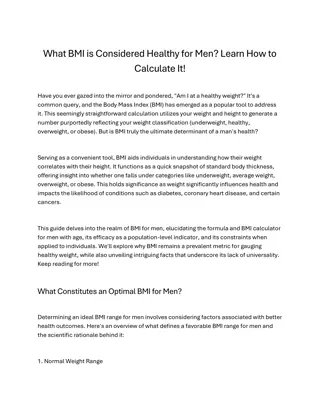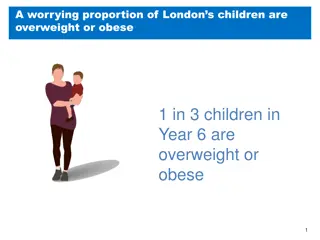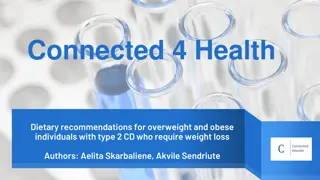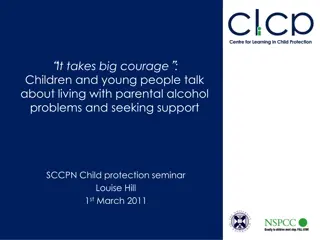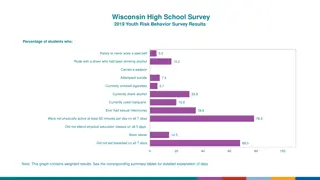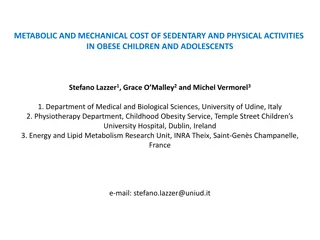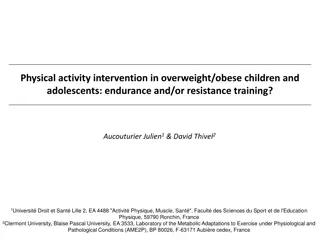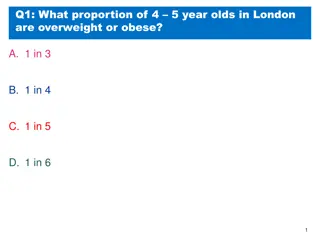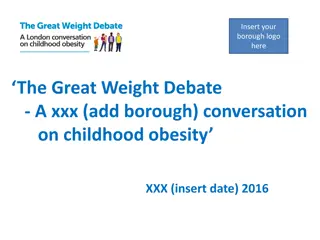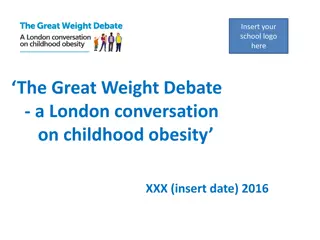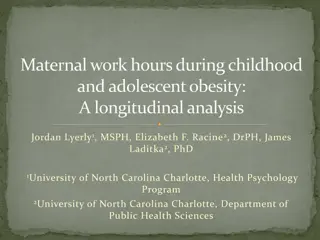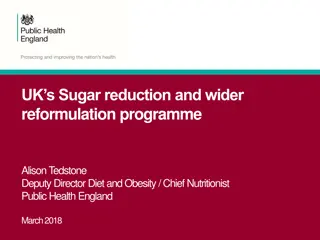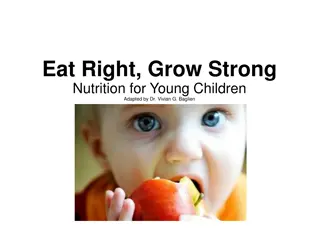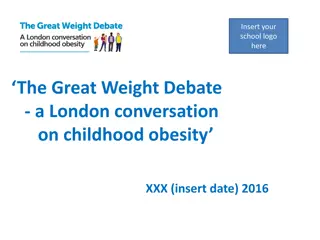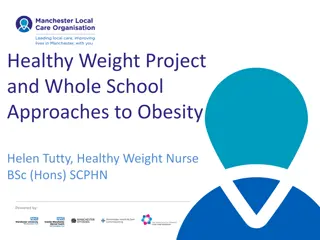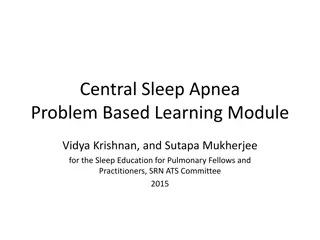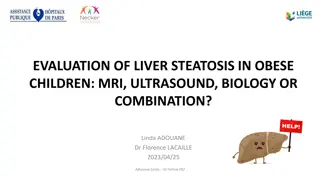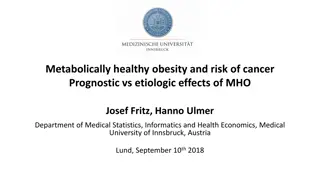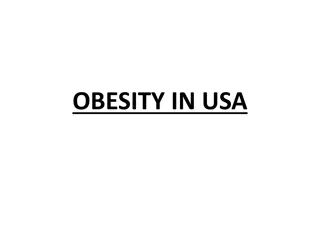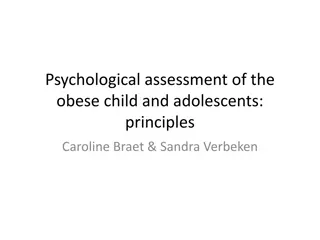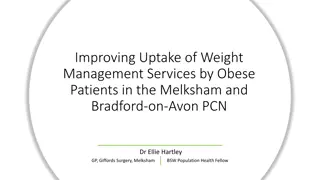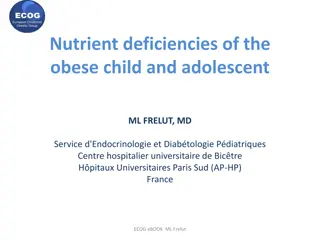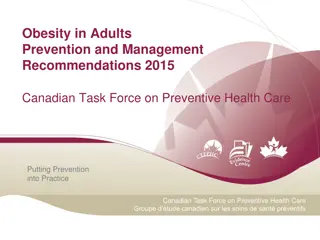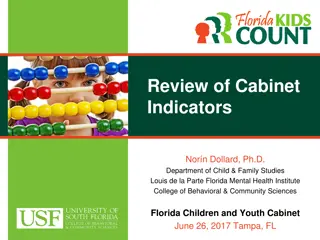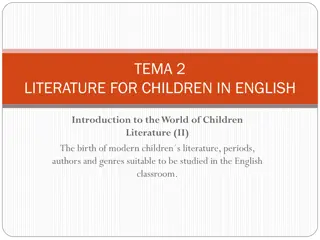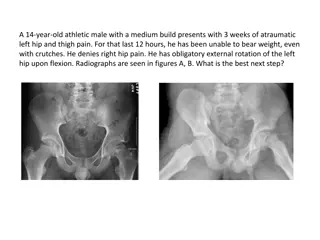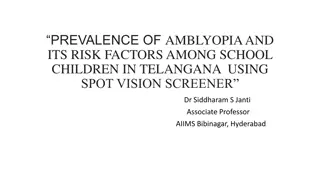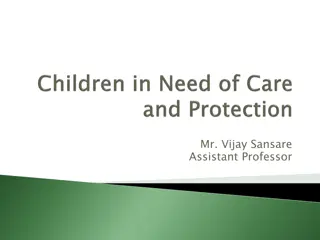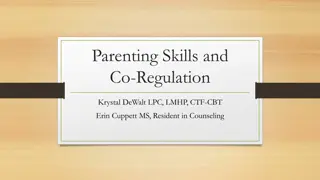Understanding Cholecystitis and Cholelithiasis: Causes, Risk Factors, and Management
Inflammation of the gallbladder (cholecystitis) and the presence of stones in the gallbladder (cholelithiasis) are common conditions. Acute cholecystitis is often caused by gallstones, while chronic cholecystitis can result from repeated attacks or chronic irritation. Risk factors include gender, ag
2 views • 21 slides
Children's and Mothers' Health Trends in Northern Ireland 2021/22
Children's health in Northern Ireland showed various trends in 2021/22, including a high rate of infants born by Caesarean section, percentages of pre-term births, multiple births, infants breastfed, low and high birth weights, and overweight and obese children. Mothers' summary in 2020/21 indicated
1 views • 23 slides
What BMI is Considered Healthy for Men? Learn How to Calculate It!
Have you ever gazed into the mirror and pondered, \"Am I at a healthy weight?\" It's a common query, and the Body Mass Index (BMI) has emerged as a popular tool to address it. This seemingly straightforward calculation utilizes your weight and height to generate a number purportedly reflecting your
3 views • 5 slides
Best Food for Obese Dogs Dubai
Anyone in Dubai who wants to feed their furry friends plant-based foods can get a good veggie dog food option from AnythingVegan. Their dog food is a balanced and healthy alternative to meat-based foods because it is made with high-quality ingredient
2 views • 1 slides
Arthritis Prevalence in New York Among General Adult Population and Those with Chronic Disease Risk Factors
The statistics present the prevalence of arthritis among adults in the United States, with a focus on New York. Over 52.5 million adults in the US have been diagnosed with various forms of arthritis. The data includes information on risk factors such as being overweight, obese, physically inactive,
0 views • 22 slides
Understanding Dvividha Upakarma: Two Kinds of Therapy in Ayurveda
Ayurveda outlines two main types of therapies - Brihmana (nourishing, enriching) and Langhana (depleting, cleansing) based on the body types of obese and lean. Brihmana therapy focuses on increasing weight and heaviness, while Langhana therapy aims to reduce weight and impart lightness. These therap
3 views • 32 slides
Addressing Childhood Obesity: A Call for Action in London
Childhood obesity in London is a significant concern, with 1 in 3 children in Year 6 being overweight or obese. This issue has far-reaching impacts on both children and society, including health problems and increased healthcare costs. Experts attribute the rising obesity rates to environmental and
2 views • 9 slides
Understanding Children's Rights and the Role of the Children's Commissioner for Wales
Children and young people up to 18 years are entitled to rights under the United Nations Convention of the Rights of the Child (UNCRC). This agreement aims to protect children and ensure they are happy, healthy, and safe. It covers topics such as the role of the Children's Commissioner for Wales, Sa
3 views • 10 slides
Dietary Recommendations for Weight Loss in Type 2 Diabetes
Dietary recommendations for overweight and obese individuals with type 2 diabetes aim to facilitate weight loss through calorie calculation, daily weighing, and structured eating patterns. Emphasis is placed on consuming at least 1200 kcal per day, avoiding meal skipping, and monitoring food intake
0 views • 18 slides
Obesity Trends and Food Environment Changes in the United States
The presentation highlights the obesity epidemic among U.S. adults and children, showing the increase in overweight and obese individuals over the years. It also discusses the rise in daily calorie availability and the percentage increase in calorie intake from different food categories. Furthermore
1 views • 11 slides
Understanding the Impact of Parental Alcohol Problems on Children
Children living with parental alcohol problems often face challenges that can have lasting effects on their well-being. This seminar highlights the need for support and courage for these children and discusses the implications for practitioners. It also sheds light on the hidden population of childr
0 views • 14 slides
Wisconsin High School Survey 2019 Youth Risk Behavior Results
The survey results from Wisconsin high school students in 2019 reveal percentages of students engaging in various risky behaviors such as not wearing seat belts, riding with intoxicated drivers, carrying weapons, attempting suicide, smoking cigarettes, using alcohol and marijuana, having sexual inte
0 views • 4 slides
Associations Between Wyoming Third Grade Body Mass Index and School Food Environment
Senate File 93 in Wyoming authorized the state's first Oral Health Initiative in 2009, focusing on measuring Body Mass Index (BMI) of third graders. The study aims to evaluate how individual and school factors influence the likelihood of children being overweight or obese. It hypothesizes that schoo
0 views • 23 slides
New Recommendations for Insulin Injection Technique and Needle Length - Guided by Expert Advice
The new recommendations emphasize using a 4mm needle for insulin injections to reduce the risk of incorrect administration. This needle length is suitable for children, adolescents, thin adults, and even obese patients. The guidelines also highlight the importance of perpendicular insertion of the n
0 views • 53 slides
Metabolic and Mechanical Cost of Sedentary and Physical Activities in Obese Children and Adolescents
A study by Stefano Lazzer, Grace O. Malley, and Michel Vermorel explores the metabolic and mechanical costs of sedentary and physical activities in obese children and adolescents. The research delves into the main components of daily energy expenditure, the contribution of organs and tissues to body
0 views • 12 slides
Combined Endurance and Resistance Training for Overweight/Obese Youth
Research discusses the benefits of combining endurance and resistance training in overweight/obese children and adolescents. It compares aerobic and resistance exercises, their effects on body composition, physical fitness, and metabolic parameters. Recommendations suggest a combination of both type
0 views • 5 slides
Childhood Obesity and Activity Levels in London and England
Rates of childhood obesity in London have increased significantly, with higher proportions of 4-5 year olds and secondary school children being overweight or obese. Furthermore, a low percentage of children in England achieve the recommended levels of physical activity. Factors such as environmental
0 views • 20 slides
Understanding Occipito-Posterior Position of the Fetal Head
Occipito-posterior position of the fetal head occurs when the head is in one of the oblique diameters with the occiput directed posteriorly. It can be categorized into Right Occipito-Posterior Position (ROP) and Left Occipito-Posterior Position (LOP), affecting 13% of vertex presentations. Causes in
0 views • 32 slides
Direct Work Strategies for Children and Young People: Newham Children Services Practitioners Workshop 2020
Explore the fundamentals of direct work with children and young people in the Newham Children Services Practitioners Workshop 2020. Discover the purpose, planning, and application of direct work, focusing on outcomes and challenges. Learn to apply a systemic and restorative approach, utilizing solut
0 views • 18 slides
The Great Weight Debate - A Conversation on Childhood Obesity in London
Childhood obesity is a significant public health challenge in London, with over a third of children being overweight or obese by the time they leave primary school. This discussion aims to gather ideas on promoting healthier lifestyles for children, addressing the environmental and social factors co
0 views • 12 slides
The Great Weight Debate - Tackling Childhood Obesity in London
In a rising global concern, London faces a staggering childhood obesity crisis with more overweight and obese children than major cities like New York and Paris. The prevalence of this issue poses numerous health risks and societal challenges, stemming from a combination of environmental and social
0 views • 12 slides
Maternal Work Hours and Adolescent Obesity: A Longitudinal Analysis
This study investigates the relationship between increased maternal work hours during childhood and adolescent obesity. It explores how maternal employment and income levels may impact the rates of adolescent obesity, utilizing data from the Panel Survey of Income Dynamics and Child Development Surv
0 views • 12 slides
UK's Sugar Reduction and Childhood Obesity Programmes
Public Health England's Deputy Director of Diet and Obesity, Alison Tedstone, leads the UK's efforts to reduce sugar intake and combat childhood obesity. The prevalence of excess weight and tooth decay among children is highlighted, along with comparisons of UK diets with nutritional recommendations
0 views • 18 slides
Importance of Good Nutrition for Young Children
Providing good nutrition to young children is crucial as it supports their rapid growth and development. More than 1 in 4 preschoolers are overweight or obese, emphasizing the need for healthy eating habits. Child care providers and parents play a key role in shaping children's dietary choices and c
0 views • 23 slides
The Great Weight Debate: London's Childhood Obesity Crisis
London faces a significant challenge with childhood obesity, surpassing global cities in overweight and obese children. This issue poses serious health risks and societal repercussions, exacerbated by environmental factors like unhealthy food availability and sedentary lifestyles. Understanding the
0 views • 12 slides
Healthy Weight Project and Whole School Approaches to Obesity by Helen Tutty, Healthy Weight Nurse
Helen Tutty, a Healthy Weight Nurse, leads a project in Manchester targeting severely obese primary school children. The project involves early intervention, providing support to families, and aims to reduce BMI over 12 months. Positive outcomes include high engagement rates and clinically significa
0 views • 10 slides
Case Study: Central Sleep Apnea in a 75-Year-Old Male with Heart Failure
A 75-year-old obese male presents with shortness of breath and palpitations, revealing a history of chronic systolic heart failure, hypertension, and end-stage renal disease. The case study delves into the patient's risk factors and clinical manifestations of central sleep apnea, addressing the impo
0 views • 11 slides
Evaluation Methods for Liver Steatosis in Obese Children
This study examines the assessment of liver steatosis in obese children using MRI, ultrasound, and biology techniques, evaluating methods such as attenuation coefficient and proton density fat fraction. The aim is to develop noninvasive biomarkers and validate existing scores for predicting NAFLD. P
0 views • 22 slides
Metabolically Healthy Obesity and Cancer Risk: Investigating the Link
Excess body weight is a known risk factor for cancer, but not all obese individuals exhibit metabolic abnormalities. This study explores the concept of metabolically healthy obesity (MHO) and its association with cancer risk, aiming to understand the unique patterns of risk transmission compared to
0 views • 17 slides
Obesity Epidemic in the USA and Global Trends
The USA faces one of the highest obesity rates globally, with two out of every three Americans considered overweight or obese. Obesity is classified based on BMI, and rates have been on the rise in OECD countries. However, recent data shows a slower pace of increase in some countries. Child obesity
0 views • 10 slides
Psychological Assessment of Obese Children and Adolescents
Principles of psychological assessment in obese children and adolescents are discussed, including the Dietary Restraint Theory (DRT), Affect Regulation Theory (ART), Reinforcement Sensitivity Theory (RST), and Diathesis-Stress Model (DSM). These theories explore the cognitive, emotional, and environ
0 views • 5 slides
Enhancing Weight Management Services for Obese Patients in Melksham and Bradford-on-Avon PCN
Improve uptake of weight management services through a Digital Weight Management Programme (DWMP) targeting obese patients. Engage patients via text messages, referrals, and personalized interventions. Increase engagement with minimal cost and admin workload, leading to positive outcomes and minimal
0 views • 5 slides
Nutrient Deficiencies in Obese Children and Adolescents
Obesity in children and adolescents can lead to multiple nutrient deficiencies, creating a double burden on their health. The diagnosis involves understanding local nutritional issues, clinical assessments, dietary recalls, and biological evaluations. Common deficiencies include vitamins A, D, E, fo
0 views • 6 slides
Obesity Prevention and Management Guidelines in Canadian Adults
Over two-thirds of Canadian adults are overweight or obese, with significant weight gain occurring in adulthood. The complexity of obesity involves biological, behavioral, social, and environmental factors. The Canadian Task Force on Preventive Health Care provides evidence-based recommendations for
0 views • 46 slides
Review of Children and Youth Cabinet Indicators in Florida
The Children and Youth Cabinet in Florida adopted six key measures as benchmarks in 2017. These indicators cover areas such as low birthweight babies, children not in school readiness programs, children living in poverty, infants and toddlers without health insurance, and children under 12 at first
0 views • 10 slides
Evolution of Children's Literature in English: From Alice to Modern Times
Explore the birth of modern children's literature starting with the publication of "Alice's Adventures in Wonderland" in 1865 by Charles Dodgson (Lewis Carrol), marking a shift towards entertaining and engaging literature specifically for children. Prior to this, children mainly read folklore and ad
0 views • 35 slides
Slipped Capital Femoral Epiphysis: Adolescent Hip Disorder
Slipped capital femoral epiphysis (SCFE) is a condition affecting the proximal femoral physis, leading to slippage of the metaphysis relative to the epiphysis. It is most commonly seen in adolescent males, particularly those who are obese. Treatment usually involves percutaneous pin fixation. Risk f
0 views • 25 slides
Prevalence of Amblyopia and Risk Factors Among School Children in Telangana
The study aims to determine the prevalence of amblyopia and its risk factors among school children in rural areas of Telangana using spot vision screener. A sample of 369 children aged 5-10 years was screened, with 84 children showing amblyogenic risk factors. Out of these, 65 children were diagnose
0 views • 7 slides
Understanding Vulnerability in Children: Factors and Categories
Children are vulnerable to exploitation, abuse, and neglect due to various factors such as age, disabilities, behaviors, and powerlessness. The vulnerability of children is compounded by factors like illness, defenselessness, and passivity. Categories such as protection and children in conflict with
0 views • 17 slides
Understanding the Impact of Trauma on Children
Trauma can significantly affect children's emotional, behavioral, and developmental well-being. Research shows that a high number of children experience traumatic events, leading to various challenges. Younger children are particularly vulnerable to the effects of trauma, depending on how their pare
0 views • 45 slides


